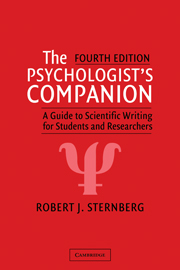Book contents
- Frontmatter
- Contents
- Acknowledgments
- Introduction
- 1 Eight Common Misconceptions about Psychology Papers
- 2 Steps in Writing the Library Research Paper
- 3 Steps in Writing the Experimental Research Paper
- 4 Rules for Writing the Psychology Paper
- 5 Using the Internet to Aid the Research Process
- 6 Commonly Misused Words
- 7 American Psychological Association Guidelines for Psychology Papers
- 8 Guidelines for Data Presentation
- 9 References for the Psychology Paper
- 10 Standards for Evaluating the Psychology Paper
- 11 Submitting a Paper to a Journal
- 12 How to Win Acceptances from Psychology Journals: Twenty-Nine Tips for Better Writing
- 13 Writing a Grant or Contract Proposal
- 14 How to Find a Book Publisher
- 15 Writing a Lecture
- 16 Article Writing 101
- References
- Appendix A Sample Psychology Paper
- Appendix B Writing for British and European Journals
- Index
5 - Using the Internet to Aid the Research Process
Published online by Cambridge University Press: 05 June 2012
- Frontmatter
- Contents
- Acknowledgments
- Introduction
- 1 Eight Common Misconceptions about Psychology Papers
- 2 Steps in Writing the Library Research Paper
- 3 Steps in Writing the Experimental Research Paper
- 4 Rules for Writing the Psychology Paper
- 5 Using the Internet to Aid the Research Process
- 6 Commonly Misused Words
- 7 American Psychological Association Guidelines for Psychology Papers
- 8 Guidelines for Data Presentation
- 9 References for the Psychology Paper
- 10 Standards for Evaluating the Psychology Paper
- 11 Submitting a Paper to a Journal
- 12 How to Win Acceptances from Psychology Journals: Twenty-Nine Tips for Better Writing
- 13 Writing a Grant or Contract Proposal
- 14 How to Find a Book Publisher
- 15 Writing a Lecture
- 16 Article Writing 101
- References
- Appendix A Sample Psychology Paper
- Appendix B Writing for British and European Journals
- Index
Summary
The Internet can be a powerful research tool. Its potential usefulness arises from three important characteristics that we will discuss in this chapter. First, it allows easy and quick access to information about a wide range of psychological topics. This access can be very helpful in exploring potential research ideas as well as for gathering background information for writing papers. Second, the Internet can be used to collect data from people in online research projects, for example in online surveys. Data from many people can be collected in a short amount of time with this technique, and the respondents' background characteristics may be much more diverse than participants in typical psychological studies. Third, the Internet enables researchers to communicate with each other quickly and inexpensively, allowing them to share research findings and discuss ideas more easily and effectively than ever before.
There are also pitfalls in using the Internet for research that can mitigate its advantages. For example, although information may be accessed easily and quickly, much of it may be either irrelevant or invalid. Effective use of the Internet requires knowing how to search for information efficiently and how to evaluate the quality of the information that is found. Other potential pitfalls are involved in using the Internet to gather data. For example, people may respond differently to an online survey than to one presented in a more traditional format.
- Type
- Chapter
- Information
- The Psychologist's CompanionA Guide to Scientific Writing for Students and Researchers, pp. 77 - 97Publisher: Cambridge University PressPrint publication year: 2003



